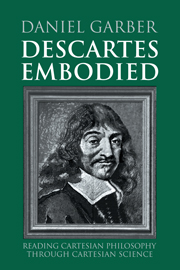Book contents
- Frontmatter
- Contents
- Acknowledgments
- Abbreviations, Citations, and Translations
- Introduction
- Part I Historiographical Preliminaries
- Part II Method, Order, and Certainty
- Part III Mind, Body, and the Laws of Nature
- 7 Mind, Body, and the Laws of Nature in Descartes and Leibniz
- 8 Understanding Interaction: What Descartes Should Have Told Elisabeth
- 9 How God Causes Motion: Descartes, Divine Sustenance, and Occasionalism
- 10 Descartes and Occasionalism
- 11 Semel in vita: The Scientific Background to Descartes' Meditations
- 12 Forms and Qualities in the Sixth Replies
- Part IV Larger Visions
- Sources
- Index
10 - Descartes and Occasionalism
Published online by Cambridge University Press: 10 November 2009
- Frontmatter
- Contents
- Acknowledgments
- Abbreviations, Citations, and Translations
- Introduction
- Part I Historiographical Preliminaries
- Part II Method, Order, and Certainty
- Part III Mind, Body, and the Laws of Nature
- 7 Mind, Body, and the Laws of Nature in Descartes and Leibniz
- 8 Understanding Interaction: What Descartes Should Have Told Elisabeth
- 9 How God Causes Motion: Descartes, Divine Sustenance, and Occasionalism
- 10 Descartes and Occasionalism
- 11 Semel in vita: The Scientific Background to Descartes' Meditations
- 12 Forms and Qualities in the Sixth Replies
- Part IV Larger Visions
- Sources
- Index
Summary
The doctrine of occasionalism was, of course, central to seventeenth century metaphysics. On this widely held view, the changes that one body appears to cause in another on impact, the changes that a body can cause in a mind in producing a sensation, or that a mind can cause in a body in producing a voluntary action are all due directly to God, moving bodies or producing sensations in minds on the occasions of other appropriate events. And so, on this view, the tickling of the retina and subsequent changes in the brain are only the “occasional causes” of the sensory idea I have of a friend in the distance; the real cause is God, who directly moves my sense organs when the light approaches them, moves the parts of the brain when the sensory organs are moved, and then produces the sensory idea I have in my mind of another person's face when my sense organs and brain are in an appropriate state. Similarly, it is God who is the actual cause of my arm's movement when I decide to raise it to wave; my volition is only an occasional cause.
Now, occasionalism was widely held among many of Descartes' followers; it can be found in various forms in Clauberg, Clerselier, Cordemoy, La Forge, Geulincx, and, most notably, in Malebranche. And throughout its seventeenth-century career it is closely associated with Descartes' followers. But to what extent is it really Descartes' own view? To what extent is it fair to attribute this view to the founder of the Cartesian school? This is the question that I shall explore here.
- Type
- Chapter
- Information
- Descartes EmbodiedReading Cartesian Philosophy through Cartesian Science, pp. 203 - 220Publisher: Cambridge University PressPrint publication year: 2000
- 1
- Cited by



